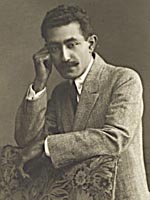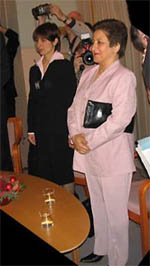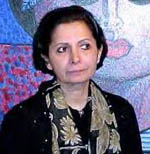 |
Ali Akbar Davar was instrumental in creating a modern legal code in Iran in the early 20th century. He worked to usher in Reza Shah and his reform-based yet autocratic Pahlavi monarchy.
Davar was educated in Belgium and his ideas about a system of justice were influenced by the West. He headed the Ministry of Justice under Reza Shah. Davar instituted judicial reforms characterized by the combination of the Shariah laws of Islam and the secular laws of France and Belgium.
In 1936, Davar took his own life due to a deep sense of frustration with Reza Shah, and the fear that the Shah may deal with him the way he had dealt with two other reformist colleagues who had been killed.
|
|
 |
Parastou Forouhar's parents, Dariush and Parvaneh Forouhar, were stabbed to death in their Tehran home in 1998. The murders were a part of a rash of killings in the intellectual community. Due to the efforts of Shirin Ebadi and other activists, Iran's Intelligence Ministry admitted that its operatives committed the crimes. Denying the institution's full responsibility, the Intelligence Ministry arrested fifteen "rogue" agents. Statements by these agents forced the Ministry's head to resign his post. After a key witness reportedly committed suicide in prison, Iranian officials never investigated claims that an intelligence committee existed for the purpose of killing dissidents.
Dariush Forouhar was the Minister of Labor in the clerical Provisional Government of 1979. At the time of his death he and his wife were serving as leaders of the banned opposition party, Hezb-e Mellat Iran (Iran Nation Party).
Parastou Forouhar has spent the past five years in and out of Iran's criminal court system fighting for justice for her parents' death. She is also an artist who has recently published a book of pen and ink illustrations on her experiences in Iran's courtrooms.
|
|
 |
Shirin Ebadi was one of Iran's first female judges. She was appointed President of the city court of Tehran in 1975, but had to resign this post during the 1979 Revolution because she was a woman.
While waiting eight years to receive her attorney's license, Ebadi worked as a legal secretary and published several books and articles on the rights of women, children and refugees. She also started her own non-profit organization. In 1993 she opened her own practice and began taking on high-profile human rights cases.
In 1998 Ebadi became a household name in her country after the broadcast of her court argument against a man who had murdered his small daughter as revenge against his wife. When the activists Dariush and Parvaneh Forouhar were murdered in their home that same year, Ebadi took on their case. She was allegedly responsible for circulating the taped confession that forced the Ministry of Intelligence to acknowledge its involvement in the crime.
Ebadi was awarded the Nobel Peace prize in 2003. She is the first Iranian to receive the award. A practicing Muslim, she says, "all principles and tenets of Islam serve to promote humanitarian values and human rights". She lives in Iran where she practices law and teaches at the University of Tehran.
|
|
 |
Mehrangiz Kar has dedicated herself to the defense of women's rights in Iran since 1979. In recent years Kar has worked closely with three other prominent Iranian activists including lawyer Shirin Ebadi, publisher Shahla Lahiji and Presidential Advisor Zahra Shojaei. Known by supporters as the "four musketeers" and by opponents as the "four mares of the apocalypse," the foursome's public image illustrated the justice debate in Iran today.
In 2000 Kar attended a conference on Iranian political reform in Berlin and was arrested along with other Iranian intellectuals who attended the event. Kar was sentenced to four years in prison, but was released to the U.S. for treatment for breast cancer. After leaving Iran Kar learned that her husband, journalist Siamak Pourzand, had gone missing. Government security forces have since announced that he is being held in prison.
Kar has written fourteen books and over one hundred articles. She has received international acclaim for her work, and was named "Human Rights Hero" in 2001 by Amnesty International. Kar currently resides in the United States and plans to return to Iran after concluding her medical treatment.
|
|
 |
Siamak Pourzand is a 72 year-old journalist, writer and intellectual who has been imprisoned in Iran for the past two years. He contributed to reformist newspapers and was critical of the government. He is serving an 11-year
prison sentence. His charge, "undermining state security through his links
with monarchists and counter-revolutionaries." Pourzand is the Manager of
Tehran's Cultural Center (Majmue-ye Farrhangi-ye Honari-ye Tehran). His
wife, lawyer and human rights activist, Mehrangiz Kar has not heard from him
in the past year.
|
|
 |
Nasser Zarafshan is both an author and human rights lawyer. He is being held in prison after defending the families of two victims of the 1998 killings connected with Iran's Intelligence Ministry. Zarafshan made a speech in 2000 blaming intelligence agents for the crimes and was arrested soon after. After receiving a closed-door trial he was sentenced to 50 lashes and five years' imprisonment. He continues to serve that sentence today.
|
|
 |
Ayatollah Mustafa Mohegh-Damad is one of the few high-level clerics in Iran educated in international law in the West. He is the grandson of Ayatollah Haeiri, who was the founder of the first comprehensive Shi'ite seminary in Qum, Iran. Ayatollah Damad advocates a more progressive interpretation of Shari'a law.
|
|
 |
Bahman Keshavarz serves as chief of the Tehran Bar Association and has published a number of books on the legal system in Iran. He is best known for his articles questioning the handling of the 2003 case of an Iranian-Canadian journalist who died in the custody of Iranian authorities.
|
|
 |
Ahmad Bashiri served as a judge in various cities in Iran until he was forced to retire during the 1979 Revolution. Bashiri waited several years to receive his license to practice law again. He is now an attorney and publishes articles on the judicial system in Iran.
|
|
 |
Abdol-Karim Lahiji is president of the Paris-based League for the Defense of Human Rights in Iran and deputy president of the International Federation of Human Rights Societies. He was the only secular legal scholar who helped draft Iran's new Constitution after the 1979 Revolution. After hard-line clerics consolidated power Lahiji moved to Paris and resides there today.
|
|
 |
Davar Ardalan collaborated with American RadioWorks in 2001 to produce With This Ring: Following the International Diamond Trail. She is a producer for NPR's Weekend All Things Considered. Her pieces cover a wide range of topics, including a series on girls and gangs in NY, the FBI's investigation of Iraqi-Americans, 25 years of gambling in Atlantic City, and an exploration of Islam in cyberspace. In April of 2002 Ardalan received a Gracie award from the American Women in Radio and Television with Jacki Lyden for their documentary of Israeli and Palestinian parents speaking about the death of their children in the conflict.
Ardalan grew up in Iran from 1965 - 1980 and worked there again as a television newscaster from 1984-1987. Davar has four children and she now resides in Maryland.
|
|
 |
Rasool Nafisi was born and raised in a small desert-town in Iran and holds a law degree from Tehran University. He moved to the United States 30 years ago where he earned a PhD in International Education and Development. He specializes in the study of Middle Eastern political culture.
Nafisi has worked as a political analyst for the BBC Persian and World services, National Public Radio, French International Radio, and Radio Free Europe. He is a professor at Strayer University in Virginia.
Back to My Name Is Iran
|



